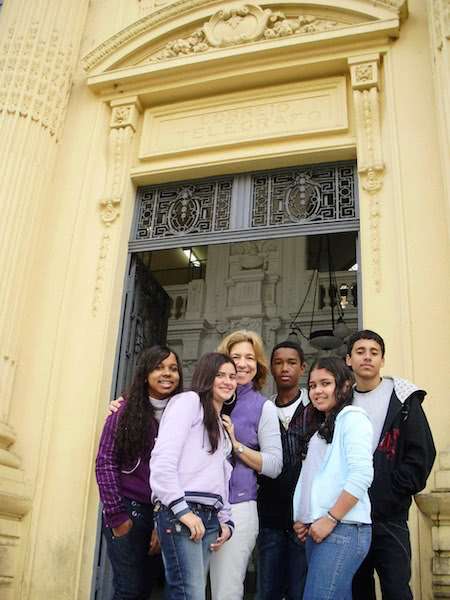We have mentioned before how Postcrossing as a school project can be a great idea. Teachers all over the world are discovering how to use Postcrossing as an educational tool. English, geography, culture – there’s so much one can learn through postcards!
Adriana Salim is one of those teachers and we are happy to be able to share with you all how her experience has been.
I am an English teacher at a public school in Petrópolis, RJ, Brazil. I teach classes to teenagers who keep me busy trying to get them interested and motivated. The dean of the school where I work found out about Postcrossing and here we are, the students and I, involved in sending and receiving cards.
I surely couldn’t have run into something more helpful! Everybody waits anxiously for the mail and the school mailbox is checked every single day. Isn’t it fun to learn English this way? Each student is a single user. They write and receive their own cards. Our enthusiasm has also hooked the Biology teacher who has joined Postcrossing with his own kids at home.
 We have many projects at the school: theater, dance, environment protection, reading and Postcrossing! Some of the students take part in more than one project.
We have many projects at the school: theater, dance, environment protection, reading and Postcrossing! Some of the students take part in more than one project.
Before Postcrossing, the students used to swap cards among themselves to practice their English skills. Nowadays we realise that it’s much more fun to write real postcards with Postcrossing.
This is where we have our Postcrossing meetings once a week.
Our postcards are mailed to the school address. The mail is always brought by the same mailman. We go to the main post office downtown for stamps. We usually post our cards once a week at a smaller facility. The students keep their own cards at home in albums or on a wallboard. Now and then we display all the received cards at school.
This is our mailman delivering some mail and the school mailbox.
This is the board we keep the cards sent to the group as a whole.
This is the main post office where we buy stamps.
We once had a picture of the cards exhibition we prepared to celebrate the 18th anniversary of our school on the first page of Petrópolis newspaper.
As part of that commemoration a school postcard was created and is now available to be send by the students.
Thank you Adriana for sharing this with us!
Have other stories on how Postcrossing is being used on education? Then let us know! We love to hear about them.







 We have many projects at the school: theater, dance,
We have many projects at the school: theater, dance, 




